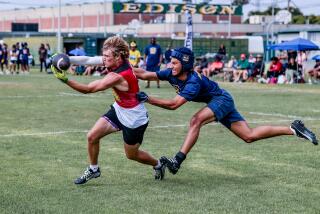Great Read: Australian football star drawn back into tough outback life
Reporting from Yuendumu, Australia — There are two ways an Aboriginal boy becomes a man in the outback: One is during “men’s business,” when boys paint themselves with ocher and head into the bush for secret initiation rites.
The other is playing Australian Rules football on the hard red dirt of the outback ground, where falling hurts and reputations are made.
They call it Aboriginal Rules, tougher than the game played on the “soft” grass fields of the big cities.
Life is tougher too: In Yuendumu, some locals say, a generation of children are growing up with their fathers away, often in jail. Educational opportunities are limited, alcohol ruinous and job prospects rare.
Aussie Rules offers a rare path to gilded heroism.
In 2007, a Melbourne football club invited three young men from the Warlpiri tribe in this small settlement about 200 miles northwest of Alice Springs for a tryout.
Each nursed a dream to be the first bush Aborigine to hit the big time and play in the Australian Football League. But only one would be chosen.
The winner would become one of the best-paid players in the massively popular sport, which most closely resembles Gaelic football, with an oval ball. He’d move from this scattering of low-slung government-built houses — where family, kin, ceremony and land are at the heart of existence — to a faraway city, a star among strangers.
He’d be a hero. But sometimes being a hero can hurt more than falling on the hard red dirt of the outback.
::
Growing up here in the central Australian desert, Liam Jurrah always dreamed of playing for the big leagues.
“I really wanted to prove to everyone I could play footy,” said Jurrah, now 26, who had been a top player for the Yuendumu Magpies when he got the call from the Melbourne club.
Of the three who were invited to play in the big city, it was Jurrah, then 20 and 6 feet 2, who was finally drafted into the national league in 2009. The two others, Sebastian Watson and Simon Fisher, said they were more exhilarated that Jurrah made it than disappointed it wasn’t them. No Aborigine had ever jumped straight from the bush into the AFL.
“The community went wild,” said Fisher, who is Jurrah’s cousin. “It put Yuendumu in the big picture. Football is like a religion; it’s like culture for us, especially the young fellas in Yuendumu.”
The first time Jurrah ran onto the 100,000-capacity Melbourne Cricket Ground, Australia’s biggest football stadium, the huge roar of the crowd was stronger than any whirling desert storm.
“It made me kind of nervous,” the soft-spoken Jurrah said. “It was hard breathing. It was just an amazing feeling.”
Jurrah kicked an unheard-of 50 goals in his first 20 games with the Demons. He stunned with his speed, agility and grace. He flew fearlessly above the shoulders of other players, sometimes crashing to the ground with the ball clutched in his hands.
“In the bush community, we just go out and play footy. There’s no structure or game plan. Playing in the big state, you’ve got to stick to the game plan and study all these moves,” he said. “It’s very fast. You’ve got to be fitter.”
He struggled with homesickness and was famously shy: The first Melbourne newspaper journalist to interview him managed to get one word out of him: “Yes.”
“It was pretty hard when I first got to Melbourne,” Jurrah said. “I was really homesick, but at the same time my partner was with me and she really helped. I was always busy with my teammates, busy training. It was crazy, getting to training and physio on time, preparing myself for games, being on time for matches. It was just full on.”
As Jurrah soared to stardom, Fisher and Watson still played community games on the dusty red Yuendumu football field, set amid scrubby bushland, the red earth turning into thick mud in the summer rains.
Jurrah’s fame made the community game more important than ever. Fisher said playing Yuendumu football “saved” some of his friends. One was drinking too much. Another teammate in an unhappy relationship talked of suicide.
“He stopped playing football. He took two years off. I encouraged him: ‘Just focus on your football.’ The footballers got behind him and gave him encouragement. He came back in 2007 and played in the winning side for Yuendumu.
“Some young fellas get wild and angry with their wives. We just encourage them to walk away or come down to the footy oval. It’s about supporting these young fellas and making them football players, supporting and encouraging them, like … follow the good road, not the bad road. It might take you somewhere, like Liam.”
But a year after Jurrah was drafted, all three footballers and the local team, which for years had symbolized the settlement’s unity, were caught in an off-field conflict that tore the community and the team apart.
::
The feud began with a scuffle in an Aboriginal settlement on the fringes of Alice Springs, where alcohol often fuels violent quarrels. Watson and his 21-year-old brother, Kwementyaye Watson, also a local football team member, were stabbed, the latter fatally.
Watson’s furious relatives wanted payback according to traditional law, which involves the nonfatal thigh spearing of a guilty man, illegal under national justice standards. Three Yuendumu men were charged, and anger boiled over in the town, splitting families asunder, pitting clan members against clan members. Riots erupted and dozens of people had to be evacuated.
Such a fight would generally have been ignored by news media. But because of Jurrah’s fame, it made headlines. Urban white Australians confronted the complexities of family payback in Aboriginal law and the disturbing cycles of violence in central Australia fed by alcohol, unemployment and poor education.
At first Jurrah resisted family pressure to fly home and get involved. But the complexities of Aboriginal tradition and his obligations as an initiated Warlpiri man, expected to defend family honor, won out.
When he did arrive, he wound up in a fight in Alice Springs involving dozens of people from both sides of the feud armed with machetes, crowbars, axes and traditional clubs called nulla-nullas. Jurrah said he was trying to stop the violence. He was charged with assaulting his cousin and resigned from the Melbourne football team. He was acquitted in 2013.
Amid waves of tit-for-tat violence, the Yuendumu team stopped playing. Many team members, who’d always been seen as the town’s heroes, served time behind bars. Jurrah was twice convicted for assaults and sentenced to three months. Sebastian Watson spent five months behind bars for assault. Fisher spent four months in jail after failing to pay a $1,800 fine for drunk driving.
“At that time I was a bit wild,” Fisher said. Although alcohol is banned in the community, he and others drank in the bush outside town. “That was my first and last time [in prison]. It got into my head. I am not doing that any more. It got me educated. That’s what grog [booze] does to you: puts you in prison.”
Jurrah was released from prison in July.
“My main goal is to get myself back on track, just keeping away from everything, just keeping myself on the safe side of the road,” he said.
“He’s home,” said Darren Talbot, Jurrah’s uncle and coach in the Alice Springs football team. “He’s just enjoying himself, getting his head space. He’s happy. He’s good. He’s smiling.”
The community is gradually repairing its rift. The Yuendumu Magpies team, including Jurrah, Watson and Fisher, started playing together again last month.
“It’s very important to get the football team back together, to get ourselves ready for the next year and also for the family to get back together. We’re all moving on, keeping ourselves busy and playing footy,” Jurrah said.
“Everything’s back to normal now,” he said, referring carefully to the conflict. “Our main focus is to get the team fit and ready for the next year.”
Jurrah knows a comeback to the national league would be a long, tough road.
“I am having a hope to get back to it one day,” he said softly. He’s still fast and hasn’t lost his talent.
Soon after leaving prison in July, Jurrah played a match for the Alice Springs team.
In Aussie Rules, it’s not uncommon for top players to average four goals a game.
That day, Jurrah kicked 14.
More to Read
Sign up for Essential California
The most important California stories and recommendations in your inbox every morning.
You may occasionally receive promotional content from the Los Angeles Times.










